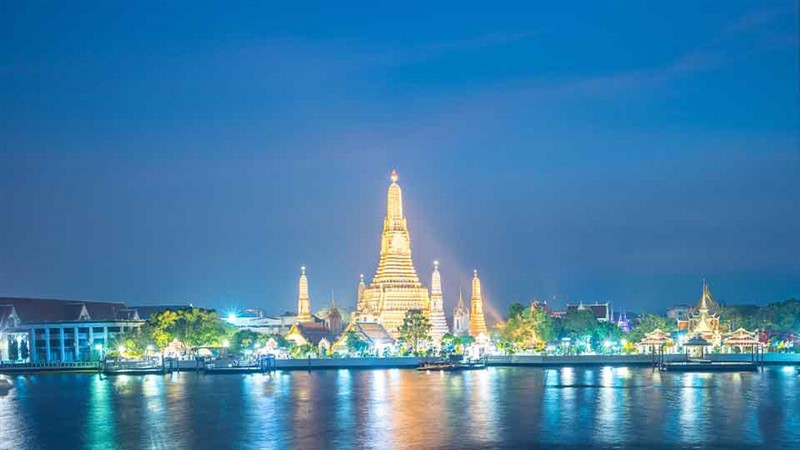2023.09 The Taiwan Banker NO.165 / By David Stinson
Money laundering and Chinese influence become campaign issues in ThailandBanker's Digest
Adversity is the mother of innovation, in the world of Southeast Asian organized crime like anywhere else. The region is long been notorious for its lawlessness. The “golden triangle” area between Thailand, Myanmar, and Laos has been known since the 1950s for its opium production. After the drug trade was brought under relative control around the turn of the century, however, Southeast Asia became better known for money laundering. Large casinos were set up around the golden triangle, geared towards a clientele from China, where gambling is illegal. This large-scale money laundering, fueled by business models like drugs in addition to wildlife trafficking related to traditional Chinese medicine, did attract some attention from global financial regulators, but it did not gain broader political significance. Two major factors however disrupted the equilibrium. The first was the pandemic, which eliminated Chinese foot traffic. Tourism from China has remained subdued even following the opening early this year, which has affected both the underground and the above-ground economy. At the same time, meanwhile, the ongoing civil war in Myanmar following the coup in 2021 has allowed industrial-scale crime to flourish. The resulting growth in organized crime has grown in scope to affect both local and international politics. “Special” economic zones This trend is best known in Taiwan for a trend of human trafficking in Cambodia to work on social engineering scams, which exploded into public view last year. That specific issue has subsided somewhat following diplomatic pressure, but it only represents one aspect of a larger problem. With the decline of in-person business over the pandemic, casino bosses and local warlords were forced to diversify their income sources. They expanded into online gaming, giving them more geographic mobility in response to crackdowns, and also providing access to a more diverse customer base. That was also what let them to experiment with their human trafficking. The borderlands and special economic zones “are very famous areas for drug trafficking in the past,” said Khemmarin Hassiri, who commands the Royal Thai Police Foreign Affairs Division, quoted in the Voice of America. “But at the present time they have everything – they have drugs, they have trafficking in persons, they have...communication fraud, they have online gambling.” During the period of shutdowns, meanwhile, borders closed, making it more difficult to transport drugs. Since the reopening, that business has returned to normal, on top of the newer profit sources. The United Nations Office of Drugs and Crime (UNODC) recently warned of a sudden jump in methamphetamine supply, which is helping supply markets as distant as Australia, India, and Japan. Thus, the economic footprint of criminal activity is larger than ever. This development is not only attracting the attention of international organizations, but also helping drive local politics. Thailand, the second-largest economy in ASEAN, is a good example. Leading from the shadows Thailand’s May general election could be seen as a referendum on democracy itself. The Move Forward Party (MFP), a liberal party with an urban base in Bangkok, won the most votes, although it was eventually unable to form a government due to a lack of allies among other parties. MFP grew out of youth protests in 2020-21, originally triggered by the dissolution of its predecessor, the Future Forward Party (FFP), over alleged funding irregularities. Later, the demands expanded to include the monarchy itself. The government made heavy use of the lese majeste law prohibiting criticism of the king – unusual in democratic systems – in order to crack down on the protests. Thailand’s monarchy goes back to the 19th century, at which time it created a government along the lines of a Western sovereign state in order to create the appearance of sovereignty and successfully avoid colonization. The monarchy has long been closely tied to the military, and coups are a persistent feature of its political system. Thus, the student protest movement is somewhat outside the mainstream of Thai politics. So-called “gray money” and “black money” has been a consistent focus of this movement. The former FFP party had accused the junta of softness against the perpetrators of the 1MDB money laundering case involving the theft of US$ 4.5 billion from neighboring Malaysia. The Thai public has been slow to catch on to the extent of the issue, but it is gradually entering the political consciousness. In this election, MFP was helped by revelations of corruption linked to China. Last November, the government was forced to back down on a proposal to ease restrictions on property purchases by foreigners following money laundering raids on individuals from China with stolen Thai identity documents. The accusations came from Chuwit Kamolvisit, a whistleblower who has been on a campaign to expose high-level corruption, much of it involving China. Chuwit, himself half-Chinese and born in Hong Kong, is also a former massage-parlor kingpin and convicted felon, who had previously come in third place twice in races to become Bangkok’s governor. He later decided that working outside the system would lead to better results, but has nevertheless publicly aligned himself with MFP. In February, he supported MFP MP Rangsiman Rome when the latter criticized Prime Minister Prayut Chan-O-Cha for slow follow-up on the earlier scandal. The awkward question In the speech, using information from Chuwit, Rome made an accusation with direct relevance to Thai-Chinese relations: he asserted that the Sha’anxi Association of Thailand, was a front for mafia activity to facilitate Thai official corruption. China is aware of the incendiary nature of such accusations, and the embassy to Thailand has warned “third-party forces” against using the issue to “discredit China and undermine the friendly cooperation between China and Thailand.” (More recent reporting has also alleged that so called “overseas police stations” in Europe also have ties to organized crime.) To some extent, China is probably being sincere in its desire to root out corruption. In addition to the factors for the uptick in crime noted above, another of the reasons for the uptick in Chinese organized crime in Thailand is that Chinese criminals have fled to Thailand following the anti-corruption campaign, as well as the increased social surveillance following pandemic controls. One of the original defenses China used to justify its “overseas police stations” after they attracted international media attention last year was that Chinese people are being victimized by scams based in Southeast Asia; indeed, it is their main market. Moreover, China is also becoming more worried about capital outflows via money laundering. At the same time, the US and other countries accuse China of protecting wanted international criminals operating in Myanmar, Laos, and even wealthier Malaysia (with the 1MDB scandal). If China is sincere about the desire to crack down on lawlessness south of its border, deeper institutional issues are apparently preventing it from mounting an effective response. The issue of Chinese state ties to criminality is a deeply divisive one for Thailand, which has strong Chinese cultural roots. “We need to jointly implement more intense checks on illegally entering Chinese people,” said Parames Wittayaraksan, a successful MFP MP candidate for Bangkok District 1. “We must not allow Chinese people to do illegal business or to use the wrong channels, while paying no taxes, which impacts small business, such as vendors at Sampeng Market,” a Chinatown wholesale market. Parames, a Thai lawyer of Chinese descent who studied in Fudan University in Shanghai, and member of the MFP international relations working group, also acknowledged the need for economic cooperation with China. Chinese capital makes up an important part of the legitimate economy in Thailand, in sectors such as automotive and electronics. Thus, Thailand is not in a position to think about wholesale ‘decoupling.’ Anti-China is not pro-US With the failure of MFP to form a government, some of these debates can be postponed. The populist Pheu Thai party, which came in second place, is forming a coalition with seven other parties, which follows an investigation of the MFP leader Pita Limjaroenrat over his ownership of a media organization. Regardless of the current power structure, however, Thailand will likely face an increasingly complex political environment over time. One immediate issue will be diplomatic relations with the Myanmar junta, an international rogue state. Over the longer term, Thailand, along with other nearby countries, will also need to face up to the evolving scourge of transnational crime. Technological advancements such as AI may continue expanding the reach of scams, perhaps eliminating the need for human trafficking. Decisions will need to be made about Chinese technological infrastructure. Thailand’s youth-led movement has shown that thinking in Southeast Asia about Chinese influence can be decoupled from great-power politics, or the specific benefits of a US alliance. This disassociation is possible precisely because the governance implications of money laundering are so multifaceted.


